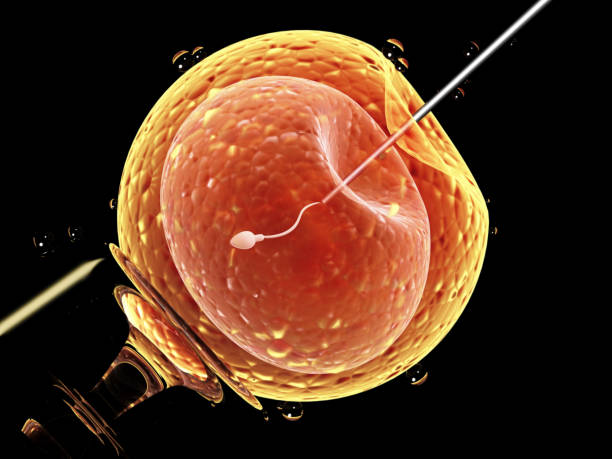Do Islam, Christianity support assisted reproduction?
Although different religions have divergent views on seeking medical help to have children, the practice in itself is not new as it has been in existence for four decades.

Cell injection – artificial insemination. Needle puncture the cell membrane. Spermatozoon in egg. Isolated on black background. 3d render
The family of Taofeek Adetona has been trying to have their own babies for 10 years, all to no avail.
They have considered seeking medical intervention but the thought of what Islam stipulates concerning conceiving through assisted reproductive technology (ART) has made them reluctant.
Just as the Adetona’s are yet to make up their mind, Oyenike Bankole, a Christian waited for 17 years before she eventually became a mother.
The mother of four, who started in vitro fertilization (IVF) in 2002, believe her religion does not discourage her from trying to conceive through other means.
Although different religions have divergent views on seeking medical help to have children, the practice in itself is not new as it has been in existence for four decades.
Basically, ART is used to treat infertility. It includes fertility treatments that handle both a woman’s egg and a man’s sperm.
It works by extracting eggs from a woman’s body. The eggs are fertilised with sperm to make embryos, which become foetuses.
The embryos are then put back in the woman’s body. ART involves procedures such as IVF, intracytoplasmic sperm injection, cryopreservation of gametes or embryos, and the use of fertility medication.
In an article published by rbmo journal, over eight million IVF children have been born in the last 40 years, and over 2.5 million cycles are performed every year, resulting in over 500,000 deliveries annually.
The two major religions in Nigeria, Christianity and Islam both have different opinions regarding conceiving through technology.
The Chief Missioner of NASFAT, an Islamic organization in Nigeria, Imam AbdulAzeez Onike has said recently, “Nothing in Islam says a woman cannot get pregnant through ART as our religion is not against it, but Islam prohibits abuse of the practice. As such, Islam frowns upon IVF for a single parent or bisexuals. In order to protect the family lineage, Islamic religion supports artificial insemination by the husband (AIH) and prohibits artificial insemination by donor (AID).”
Explaining how religion and ART intertwine, Imam Onike mentioned that in ART practice, Islam prohibits three options as it involves third parties: surrogacy, egg donation and AID.

In a webinar, Onike told hundreds of Muslims, “Not everyone will have a child but you can have faith that you will have your own kids. Seek medical care, don’t lose hope, make efforts but do it in the halal way if you are having problems with having your own kids.”
According to the Imam, certain conditions must be met before a couple decides to have children through IVF.
“The sperm must come from the man, carried out by medical personnel, it must not be abused, it must not be done for child selection and there should be no third-party intrusion.”
An elderly Muslim man who has done IVF for conception with his wife, Lateef Sanbe recounted, “From experience, I could remember that 15 years ago, we were with one of our doctors and after series of tests, we were told nothing is wrong with us and we were advised to consider going for IVF. We had to go for it in Ilorin considering our age. What I know is that there is no condition that is enforceable on a couple in a fertility clinic as their consent is paramount. The clinic will only do what the couple agrees on.
“Young couples should not wait up to 10 years before seeking medical intervention if they are having problems with having their children,” Sanbe suggested.
However, Christianity has no restrictions regarding ART as explained by Rev Funke Adejumo.
She emphasized, “Enough of the fasting and praying. God can do it through medical or other religious angles. Enough of crying at home, do something.”
Citing various instances, Adejumo expressed her concern over what people have done and gone through in the quest for a child.
Some people, she said, have waited for 23 years without a child and others like Mrs Bankole waited for 17 years before she could have her children.
Mrs Oyenike Bankole while recounting her journey from infertility to becoming a mother of four admitted, “I wanted to do surrogacy but my husband opted for IVF and we had four children through IVF after many years of waiting. I started doing IVF in 2002 and it did not click until 2005, but I lost the pregnancy. I never gave up because it was after the 12th trial that I finally gave birth to my first twin girls and I opted for the 13th trial which led to me having twin boys. Persistence is important.”
She advises young couples: “Pray and be patient when you are looking for children. Don’t stress yourself, if you need help, go to a fertility clinic. If you have eggs to store, store it so as to avoid regret later.”
In his contribution to the role of religion in assisted fertility, the CEO of Nordica, Dr Abayomi Ajayi stated that knowing the views of religion in ART is important.
“Ethical consideration is one thing religion has helped us with in our practice,” he noted.
